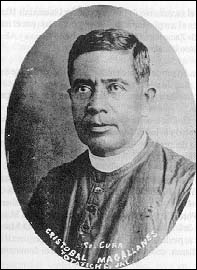The twentieth century saw the rise of various vicious anti-Catholic regimes, totalitarian and ruthless in their demonic fury to stamp out the Church. Ecrasez l’infame! Voltaire would sign off his letters, but they – the Nazis, the Communists, the Spanish ‘Republicans’, and, for our purposes today, the atheistic Mexican government which, for reasons that are complex, from 1926 to 1934, persecuted the Church in that country with a relentlessness that still beggars the imagination.
Untold numbers of martyrs were the result- 4,000 priests were either killed or expelled, and by 1934 only 334 priests were ‘licensed’ to minister to a population of 15 million Catholics. Amongst those glorious victims whom we celebrate the parish priest Cristóbal Magallanes Jara (1869 – 1927) and twenty-one companion martyrs. Father Magallanes entered the seminary at the age of 19, but with little formal schooling. He was ordained in his thirtieth year in 1899, and appointed parish priest of his hometown, Totatiche. As was the custom and necessity back then, and in many ways still is, the priest had his fingers in many pies, not only sacramental ministry, but founding schools, and centres of training for carpentry and other skills, even helping set up a local dam.
In the background, persecution and rebellion were fomenting. The government under the military general, fervent freemason, and bitterly anti-Catholic Plutarco Elías Calles was not only persecuting the Church, but subverting all aspects of life, from education, to family life and local farms. The people rose up in revolt in the ‘Cristeros’ movement, as portrayed in the film ‘For Greater Glory’, and it was difficult to disentangle the political from the spiritual resistance. Father Magallanes preached against violence – not that this made the choice of the Cristeros immoral, for the Church has always taught that such armed resistance against state aggression may at times be morally justified, and even necessary. But the Calles government was not much into philosophical distinctions, and Father Magallanes was charged with conspiracy against the government regardless of his pacific tendencies, arrested on May 21, 1927, and shot four days later without trial, along with his fellow younger priest, Agustín Caloca Cortés. The latter was offered freedom, but he would only take it if Father Magallanes were also released. This was refused, and they both went to God, ‘for greater glory’. (Father Miguel Pro would follow them on November 23rd, of that same year)
Father Magallanes forgave his executioners, and gave away all his few possessions, and with his final words before the bullets shattered his body and sent his soul to heaven, declared: I die innocent, and ask God that my blood may serve to unite my Mexican brethren.
Pope John Paul II canonized Father Magallanes, Father Cortes and twenty other martyrs of the Mexican revolution on this day in the Jubilee Year 2000, and we will leave you for now with his words, which ring through this third millennium of the Christian era, as various states become more disturbingly like Calles’. We should pray for the grace to discern our own paths, the strength to resist what we should, and the light always to see the truth:
In the first reading we heard how Paul moved about Jerusalem, “preaching boldly in the name of the Lord. And he spoke and disputed against the Hellenists; but they were seeking to kill him” (Acts 9: 28-29). Paul’s mission prepares for the growth of the Church, which will take the Gospel message everywhere. And in this expansion, persecution and violence against those who preached the Good News were not lacking. But despite human adversities, the Church relies on the promise of divine help. This is why we heard that “the Church … had peace and was built up; and walking in the fear of the Lord and in the comfort of the Holy Spirit, it was multiplied” (Acts 9: 31).
We can well apply this passage from the Acts of the Apostles to the situation which Cristóbal Magallanes and his 24 companion martyrs had to endure in the first 30 years of the 20th century.
Most of them belonged to the secular clergy and three were laymen seriously committed to helping priests. They did not stop courageously exercising their ministry when religious persecution intensified in the beloved land of Mexico, unleashing hatred of the Catholic religion. They all freely and calmly accepted martyrdom as a witness to their faith, explicitly forgiving their persecutors. Faithful to God and to the Catholic faith so deeply rooted in the ecclesial communities which they served by also promoting their material well-being, today they are an example to the whole Church and to Mexican society in particular.
After the harsh trials that the Church endured in Mexico during those turbulent years, today Mexican Christians, encouraged by the witness of these witnesses to the faith, can live in peace and harmony, contributing the wealth of Gospel values to society. The Church grows and advances, since she is the crucible in which many priestly and religious vocations are born, where families are formed according to God’s plan, and where young people, a substantial part of the Mexican population, can grow up with the hope of a better future. May the shining example of Cristóbal Magallanes and his companion martyrs help you to make a renewed commitment of fidelity to God, which can continue to transform Mexican society so that justice, fraternity and harmony will prevail among all.
Father Magallenes, Cortes and Companion Martyrs, oren por nosostros!
(source: wikipedia.org)










